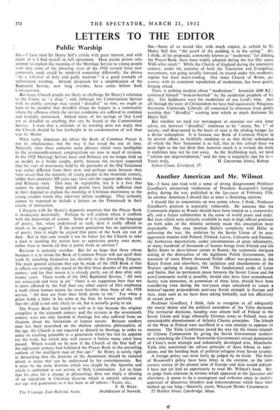LETTERS TO THE EDITOR
Public Worship
Sta,—I have read Sir Henry Self's article with great interest, and with much of it I find myself in full agreement. Most parish priests who attempt to explain the meaning of the Marriage Service to young people wish that some of the phrasing, even of the 1928 revised form now commonly used, could be rendered somewhat differently; the phrase " be a follower of holy and godly matrons " is a good example of unfortunate wording. Already proposals for a simplification of the Baptismal Service, now long overdue, have come before both Convocations.
But many Church people are likely to challenge Sir Henry's reference to the Litany as " a dirge "; and, although the Commination Service with its public cursings may sound " dreadful " to him, we ought at least to be mindful that dreadful things do happen in a community where the offences which the service condemns are suffered to continue and multiply unchecked. Indeed many of the sayings of Our Lord are as dreadful as anything that can be found in the Commination Service. I trust that a criticism of its wording does not imply that the Church should be less forthright in its condemnation of evil than was its Master What really impresses me about the Book of Common Prayer is not its obsolescence, but the way it has stood the test of time. Naturally after three centuries some phrases which were intelligible to the seventeenth-century congregations are now in need of revision. In the 1928 Marriage Service Isaac and Rebecca are no longer held up as models to a bridal couple, partly because the revisers suspected that the view of matrimony held by the patriachs of the Old Testament was rather different from their own, and perhaps more because they were aware'that the majority of young people in the twentieth century, unlike their ancestors 300 years ago, have not the vaguest idea who Isaac and Rebecca were. This may be regrettable, but it is a fact that cannot be ignored. Most parish priests have barely sufficient time at their disposal to explain the meaning of Christian matrimony to the young couples whom they interview before weddings. They certainly cannot be expected to include a lecture on the Pentateuch in their course of instruction.
I disagree with Sir Henry's dogmatic assertion that the Prayer Book is inadequate doctrinally. Perhaps he will explain where it conflicts with the discoveries of science. Some of it is couched in the language of poetry, but, when understood as such, does it really offend as much as he suggests ? If the present generation has no appreciation of poetry then it might be argued that parts of the book are out of date. But in that case would it not be better for the Church to take a lead in teaching the nation how to appreciate poetry once more, rather than to banish all that is poetic from its services ?
Revision is certainly overdue. But let us hope that those whose business it is to revise the Book of Common Prayer will not spoil their work by attaching themselves too slavishly to the prevailing Zeitgeist. The main general criticism that can be made of the 1928 Book is that it reflects too strongly the mood of the first three decades of the present century, and for that reason it is already partly out of date after only twenty years. Those words of the 1662 Baptismal Service, " All men are conceived and born in sin " (there is no suggestion here that sex is more affected by the Fall than any other aspect of life) emphasise a truth about human nature far more forcibly than those of the 1928 service, " All men are from their birth prone to sin." For when a priest holds a baby in his arms at the font, he knows perfectly well that the child is not only likely to sin, bin is actually going to sin.
The Prayer Book has lasted as well as it has because the original compilers in the sixteenth century and the revisers in the seventeenth century were not only learned in theology but also suffered from no illusions about the limitations of human nature. Because modern man has been nourished on the shallow optimistic philosophies of the age, the Church is not required to discard its theology in order to make its teaching palatable to a generation which has lost its appetite for the truth, but which may well recover it before many years have passed. Where would we be now if the Church of the first half of the eighteenth century had fashioned the Prayer Book to the prevailing outlook of the intelligent man of that age ? Sir Henry is surely right in demanding that the doctrine of the Atonement should be restated afresh in terms that can be understood by his contemporaries. But it must be the same doctrine which was taught by the Apostles and which is enshrined in our service of Holy Communion. Let us hope that his plea for a change in phraseology does not imply a diluting of an ingredient in Christian doctrine which is entirely relevant to our age and generation as it has been to all others.—Yours, etc., The Vicarage, East Retford, Notts. F. H. WEST. Archdeacon of Newark.


































 Previous page
Previous page